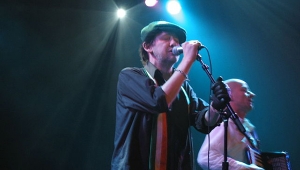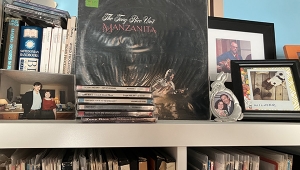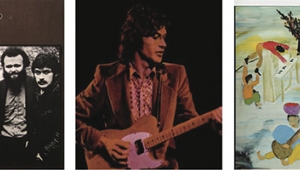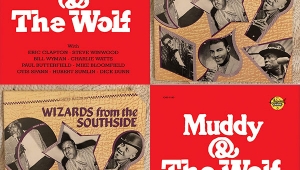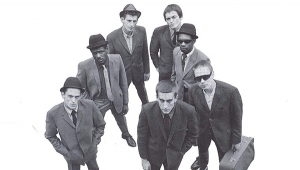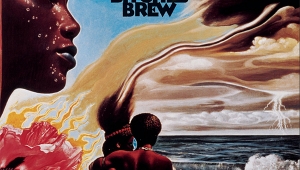| Columns Retired Columns & Blogs |
Boys' rock band, summer of '66

It was another glorious Lower Cape summer, the warm breeze almost viscous against your skin. Tim Dickey played bass, or ersatz bass, tuning his Gibson SG Special down an octave. I played drums. My brother John and cousin Dave Scherman traded leads. Tony Kahn was a good guitarist, but with the surfeit of guitarists, he played organ. We practiced at the Dickeys', across Great Pond, Truro, from the Big Cabin, my family's house. These were the days when the bourgeoisie owned summer homes on the Cape, or in the Hamptons, or Maine, and took three-month vacations—the wives and kids, that is, while the fathers stayed in the sweltering cities, joining their dependents in August.
Footnote 1: "California Sun" has an odd provenance for a surfer song, written by the black, largely R&B, songwriter/producer Henry Glover and first recorded by R&B singer Joe Jones.
If the other Tony could be a mite supercilious, it was a trait inherited from his father, E.J. Kahn, Jr., a lifelong New Yorker staff writer and Truro's chief social lion, at whose rambling house on South Pamet Road every day was a Kahn Festival, the cream of Truro society mingling at cocktail hour around the tennis court and on the front lawn.
John, Tim, David, and the other Tony were gifted musicians; I was an okay drummer. John and David were 14, Tim and Tony 13, and I was 12. Thirteen that August.
The Black Comedies, as we called ourselves, weren't some dickhead teenybopper band. We were sophisticates, connoisseurs especially of '50s rhythm and blues: Chuck Berry, Bo Diddley, Muddy Waters. (We diluted our purism with a few British Invasion hits.) We loved new R&B, too, doing our barely pubescent best to emulate Wilson Pickett's buzz-saw screams. (I shudder to think how that sounded.)
Our first gig was a dance at the Chequessett Neck Yacht Club in Wellfleet, where the Dickeys raced their Lightning. We were to open for a highly touted group of older guys, mainstays of the yacht club circuit, who, we were forewarned by the club's social director, were going to wipe the floor with us. Their organist, a tall, plump late teen in a pink-and-white-striped sports shirt, stopped by as we were setting up. He seated himself at his Hammond B3, and a peppy, bouncy, ludicrously uncool sound filled the room: surf music, the frat-rock Rivieras' "California Sun" ("Well, they're out there a-havin' fun/In that warm California sun ..."). Doubled over, all five Black Comedies managed to stagger outside and roll on the ground, convulsed with the superior laughter of the hip (footnote 1).
We acquitted ourselves well that night, in our dirty T-shirts and bare feet (mine were, at least: Summers, I foreswore shoes). Over that lurching "Hoochie Coochie Man" riff, John leaned into the mike and spoke-sang Muddy's portentous opening lines: "Gypsy woman told my mother"—ba BOM ba BOM—"Before I was born ... ." It was the first deep blues ever heard in Wellfleet, Massachusetts.
At practices, I had insisted that, as per the Stones original, the rest of the band drop out of "Satisfaction" while I pounded out Charlie Watts's kickass one-and-a-half-bar solo. Tonight, on cue, Tony Kahn got right up in my face, clapping along with a big mock-congratulatory smirk, spoiling my five seconds of glory. I sort of had it coming.

When it was the headliners' turn to play, we loitered disdainfully by the door. Presently, two girls our age came over, equally derisive of the music. Nor were these just any girls. The bolder of the two, with her long black hair, heavy eyeliner, bangs like Cher's, and noticeable Long Island accent, was, to our incredulity, rhythm and blues royalty: Anita Wexler, daughter of the man who literally coined the term. Along with the brothers Nesuhi and Ahmet Ertegun, Jerry Wexler ran Atlantic Records, to our minds the nation's hippest label. Atlantic underwrote Stax, home to Otis Redding, Sam and Dave, Booker T. and the MGs. We idolized Otis; Anita knew him; he was family. We were privy to inside knowledge: Otis, our new friend told us, called the Ertegun brothers "Almond" and "Nestlé." (footnote 2)
Capeside for the weekend, the poor thing was bored out of her gourd, stranded on this godforsaken sandbar when she could have been back in Great Neck lounging poolside with King Curtis.
Soon enough, it was time to load our gear into the Dickeys' station wagon and bid Anita goodbye. She was to have a short, unhappy life. As the story goes, by 1972, a half-dozen years after our encounter with her, Anita was using heroin. On and off smack for years, she died of AIDS at 38. Some writers have written that Dr. John introduced her to the stuff.
The Black Comedies had just one other job that summer, at the Provincetown Art Association, a museum on P'town's bustling Commercial Street. I dimly remember the evening, the one image I can summon the gallery's burly, bearded, middle-aged director doing the Jerk to the funky bottom that Tim and I had taken the summer to nail. Provincetown rocked all that summer.
On August 31, a few days after we played the Art Association—here it was almost Labor Day, time to pack up, go home, and start eighth grade—an almost equally obscure group, from New York City, was booked into the Chrysler Art Museum, just up Commercial Street from the PAA. Which band proved the bigger draw that summer is anyone's guess, but I guarantee I was a far better drummer than the Velvet Underground's Maureen "Moe" Tucker.
Footnote 1: "California Sun" has an odd provenance for a surfer song, written by the black, largely R&B, songwriter/producer Henry Glover and first recorded by R&B singer Joe Jones.
Footnote 2: According to Jonathan Gould, author of Otis Redding: An Unfinished Life, Otis had another nickname for the younger Ertegun: "Omelet."
- Log in or register to post comments



